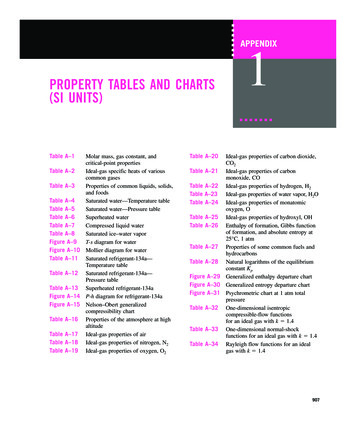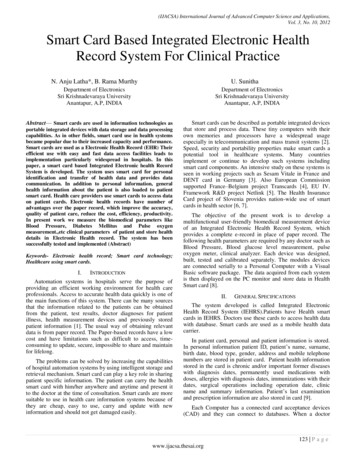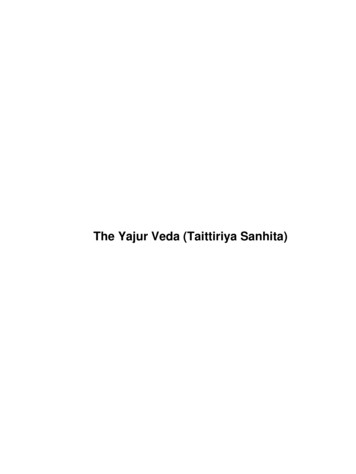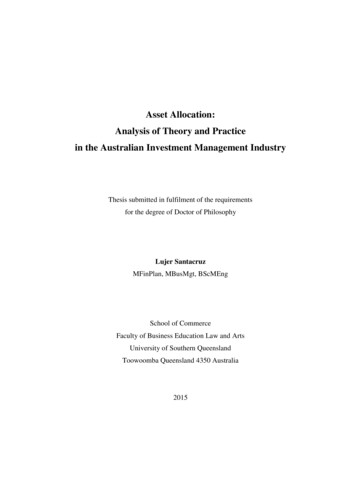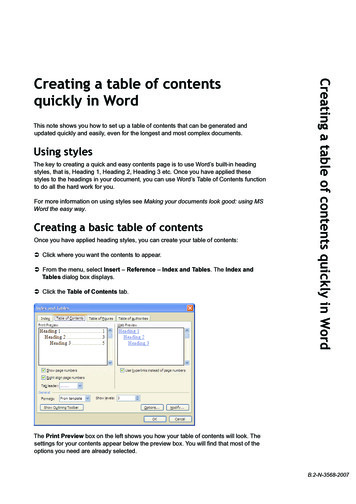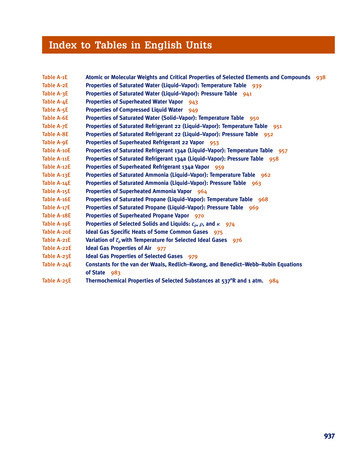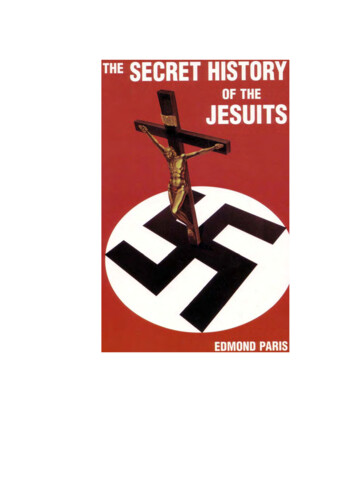
Transcription
TABLE OF CONTENTSForeword by Edmond Paris.7Section I The Founding of the Jesuit Order1.2.3.4.5.Ignatius of Loyola.The Spiritual Exercises.The Founding of the Company.The Spirit of the Order.The Privileges of the Company.1520232528Section II The Jesuits in Europe during the 16th and 17th Centuries.1.2.3.4.5.6.Italy, Portugal, Spain.Germany.Switzerland.Poland and Russia.Sweden and England.France.313438404245Section III Foreign Missions1.2.India, Japan, China.The Americas: The Jesuit State of Paraguay.5055Section IV The Jesuits in the European Society1.2.3.4.5.6.7.8.9.The teaching of the Jesuits.The morals of the Jesuits.The Eclipse of the Company.Rebirth of the Society of Jesus during the 19th Century.The Second Empire and the Falloux Law — The War of 1870.The Jesuits in Rome — The Syllabus.The Jesuits in France from 1870 until 1885.The Jesuits and General Boulanger.The Jesuits and the Dreyfus Affair.The Years before the War — 1900-1914.5963677376828895110
Section V The Infernal Cycle1.2.3.4.5.6.7.8.The First World War.Preparations for the Second World War.German Aggression and the Jesuits. Austria - Poland Czechoslovakia - Yugoslavia.The Jesuit movement in France before and duringthe 1939-1945 War.The Gestapo and the Society of Jesus.The Death Camps and the Anti-Semitic Crusade.The Jesuits and the Colleqium Russicum.Pope John XXIII removes the 3191199
Publisher's IntroductionThere is no other person more qualified to introduce Edmond Paris' book,"The Secret History of the Jesuits," than Dr. Alberto Rivera, a former Jesuitpriest under the extreme oath and induction, who was trained in theVatican and briefed on the history of the Jesuits.The information in this book is factual and fully documented, and itshould be read by every Bible-believing Christian in the United States andCanada. The Bible says, "My people are destroyed for lack ofknowledge." (Hosea 4:6)J.T. CDr. Rivera's IntroductionThe most dangerous of men are those who appear very religious,especially when they are organized and in a position of authority. They havethe deep respect of the people who are ignorant of their ungodly push forpower behind the scenes.These religious men, who pretend to love God, will resort to murder, inciterevolution and wars if necessary to help their cause. They are crafty,intelligent, smooth religious politicians who live in a shadowy world ofsecrets, intrigue, and phony holiness. This pattern, seen in "The SecretHistory of the Jesuits," spiritually speaking can be seen in the Scribes,Pharisees and Sadducees at the time of Jesus Christ. This same evil spiritdirected the Roman emperors to issue the ten murderous decrees topersecute the early Christian church.The "Early Fathers" observed most of the ancient Babylonian system plusJewish theology and Greek philosophy. They all perverted most of theteachings of Christ and His apostles. They paved the way for the RomanCatholic machine that was to come into existence. Piously, they attacked,perverted, added to and took away from the Bible. This religious antichrist spirit working through them is seen again when Ignatius de Loyolacreated the Jesuits to secretly accomplish two major goals for the RomanCatholic Institution: 1) universal political power, and 2) a universal church,in fulfillment of the prophecies of Revelation 6, 13, 17 and 18.By the time Ignatius de Loyola arrived on the scene, the ProtestantReformation had seriously damaged the Roman Catholic system. Ignatius deLoyola came to the conclusion that the only way his "church" could survivewas by enforcing the canons and doctrines on the temporal power of the popeand the Roman Catholic institution; not by just destroying the physical life ofthe people alone as the Dominican priests were doing through theInquisition, but by infiltration and penetration into every sector of life.Protestantism must be conquered and used for the benefit of the popes. Thatwas Ignatius de Loyola's personal proposal, among others, to Pope Paul III.Jesuits immediately went to work secretly infiltrating ALL the Protestantgroups including their families, places of work, hospitals, schools, colleges,etc. Today, the Jesuits have almost completed that mission.
The Bible puts the power of a local church into the hands of a Godly pastor. Butthe cunning Jesuits successfully managed over the years to remove thatpower into the hands of denomination headquarters, and have now pushedalmost all of the Protestant denominations into the arms of the Vatican.This is exactly what Ignatius de Loyola set out to accomplish: a universalchurch and the end of Protestantism.As you read "The Secret History of the Jesuits," you will see there is aparallel between the religious and political sectors. The author, Mr. Paris,reveals the penetration and infiltration of the Jesuits into the governmentsand nations of the world to manipulate the course of history by setting updictatorships, and weakening democracies such as the United States ofAmerica, by paving the way for social, political, moral, military, educationaland religious anarchy.The man, Edmond ParisIn the prophetical works of the Book of Revelation, Edmond Paris became amartyr for Jesus. In exposing such a conspiracy, he put his life at stake fortruth of the prophetical signs to be known. Edmond Paris never knew me, butI knew him without meeting him personally when I, with other Jesuitsunder the extreme oath and induction, was being briefed on the names ofinstitutions and individuals in Europe who were dangerous to the goals ofthe Roman Catholic Institution. His name was given to us.Works by Edmond ParisLE VATIAN CONTRE LA FRANCE GENOCIDE INTHE SATELLITE CROATIA THE VATICANAGAINST EUROPEThe Edmond Paris works on Roman Catholicism brought about the pledge onthe part of the Jesuits to: 1) destroy him, 2) destroy his reputation, includinghis family, and 3) destroy his work. And even now these great works ofEdmond Paris are being tampered with, but we are praying that God willcontinue to preserve them when they are most needed for the salvation ofRoman Catholic people.YOURS FOR THE SALVATION OF THEROMAN CATHOLIC PEOPLE,DR. ALBERTO RIVERA (EX-JESUIT PRIEST)
"The love of truth is our only salvation"Jean Guehenno of theFrench Academy"Wherefore putting away lying,speak every man truth .(Eph. IV, 25.)ForewordA last century writer, Adolphe Michel, recalled that Voltaire estimated thenumber of works published over the years, on the Jesuits, to be about sixthousand. "What number have we reached a century later?", asked AdolpheMichel, only to conclude immediately: "No matter. As long as there areJesuits, books will have to be written against them. There is nothing new leftto be said on their account, but new generations of readers come every day.Will these readers search old books?"(l)The reason just mentioned would be enough to justify us taking up again thisoft-told subject. In fact, most early books retracing the history of the Jesuitscannot be found any more. Only in public libraries can they still be consulted,which makes them out of reach for most readers. With the aim of succinctlyinforming the public at large in mind, a summary of these works seemednecessary.There is another reason, as good as the one just mentioned. At the sametime as new generations of readers come, new generations of Jesuits come tolight. And these work today with the same tortuous and tenacious methods,which so often in the past set to work the defensive reflexes of nations andgovernments. The sons of Loyola are today—and may we say more thanever—the leading wing of the Roman Church. As well if not betterdisguised than of old, they remain the most eminent "ultramontanes",the discreet but efficacious agents of the Holy See throughout the world, thecamouflaged champions of its politics, the "secret army of the Papacy".For this reason, the subject of the Jesuits will never be exhausted and, eventhough the literature concerning them is so plentiful, every epoch will have theduty to add a few pages to it, to mark the continuity of this occult systemstarted four centuries ago "for the great glory of God", but in fact( 1 ) Adolphe Michel: "Les Jesuites" (Sandoz et Fischbacher, Paris 1879).
8THE SECRET HISTORY OF THE JESUITSfor the glory of the pope. In spite of the general move towards an everincreasing "laicization", in spite of the ineluctable progress of rationalismwhich reduces a little more every day the domain of "dogma", the RomanChurch couldn't give up the great purpose which has been her goal from thebeginning: to gather under her crozier all the nations of the universe. Thismonumental "mission" must go on, whatever happens, amongst "pagans" aswell as amongst "separated Christians". The secular clergy having, inparticular, the duty to hold the acquired positions (which is quite arduousnowadays), it is up to certain regular orders to increase the flock of thefaithful by converting the "heretics" and "pagans", a work even morearduous. The duty is to preserve or acquire, to defend or attack, and at thefront of the battle there is that mobile force of the "Society of Jesus"—theJesuits. Properly speaking, this society is not secular, nor regular in terms ofits Constitution, but a kind of subtle company intervening where and when itis convenient, in the church and outside the church, in short "the agent mostskilful, most persevering, most fearless, most convinced of the papalauthority.", as wrote one of its best historians.(2)We will see how this body of "janissaries" was formed, what servicewithout price it rendered the papacy. We will see also how so mucheffectual zeal was to make it indispensable to the institution it served,exerting such an influence over it that its General was named with goodreason the "black pope", as it became more and more difficult todistinguish, in the government of the church, the authority of the white popeand that of its powerful coadjutor.It is then at the same time a retrospective and a bringing up to date of thehistory of "Jesuitism" which is found in this book. As the majority of worksregarding the Jesuits do not refer to the paramount part they took in theevents which have subverted the world during the past fifty years, wethought it was time to fill up the gap or, more precisely, to start with ourmodest contribution a deeper study into the subject, and do this withoutconcealing the obstacles which will be met by the non-apologist authorswanting to make public writings on this burning subject.Of all the factors which have played a part in the international life of acentury full of confusion and upheavals, one of the most decisive—nevertheless best recognized—resides in the ambition of the RomanChurch. Her secular desire to extend her influence towards the East made herthe "spiritual" ally of Pan-Germanism and its accomplice in the attempt to gainsupreme power which twice, in 1914 and 1939, brought death and ruin to thepeoples of Europe.(2a)(2) A. Michel, op.cit.(2a) See Edmond Paris: Le Vatican contre l'Europe (Fischbacher, Paris), (also P.T.S.,London), and L. Duca "L'Or du Vatican" (Laffront, Paris).
FOREWORDThe public is practically unaware of the overwhelming responsibilitycarried by the Vatican and its Jesuits in the start of the two world wars—asituation which may be explained in part by the gigantic finances at thedisposition of the Vatican and its Jesuits, giving them power in so manyspheres, especially since the last conflict.In fact, the part they took in those tragic events has hardly beenmentioned until the present time, except by apologists eager to disguise it.It is with the aim of rectifying this and establishing the true facts that wepresent in this and other books the political activity of the Vatican duringthe contemporary epoch—activity which mutually concerns the Jesuits.This study is based on irrefutable archive documents, publications fromwell-known political personalities, diplomats, ambassadors and eminentwriters, most of whom are Catholics, even attested by the imprimatur.These documents bring to light the secret actions of the Vatican and itsperfidious actions in creating conflicts between nations when it served itsinterests. With the help of conclusive articles, we show the part played bythe "church" in the rise of totalitarian regimes in Europe.These testimonies and documents constitute a crushing indictment and,so far, no apologist has tried to disprove them.On the first of May 1938, the "Mercure de France" reminded us of whathad been said four years earlier:"The Mercure de France of the 15th of January 1934 said—and nobodycontradicted it—that it was Pius XII who 'made' Hitler. He came to power,not so much through legal means, but because the pope influenced theCentrum (german catholic party). Does the Vatican think it made apolitical error in opening the way to power to Hitler? It doesn't seem so."It didn't seem so when that was written, which was on the day followingthe "Anschluss' when Austria was united to the third Reich—nor laterwhen Nazi aggressions multiplied—nor during the whole of the SecondWorld War. In fact, on the 24th of July 1959 the successor of Pius XII,John XXIII, conferred on his personal friend Franz Von Papen thehonorary title of secret chamberlain. This man had been a spy in the UnitedStates during the first world war and one of those responsible for theHitler's dictatorship and the Anschluss. One must suffer from a peculiarkind of blindness not to see such plain facts.Mr. Joseph Rovan, Catholic writer, comments on the diplomaticagreement between the Vatican and the nazi Reich on the 8th of July 1933:"The Concordat brought to the national-socialist government,considered nearly everywhere to be made up of usurpers, if not brigands,the seal of an agreement with the oldest international power (the Vatican).In a way, it was the equivalent of a diploma of international honorability".(Le catholicisme politique en Allemagne, Paris 1956, p.231, Ed. du Seuil).Thus the Pope, not satisfied with giving his "personal" support to Hitler,9
10THE SECRET HISTORY OF THE JESUITSgranted in this way the moral support of the Vatican to the nazi Reich! Atthe same time as the terror was beginning to reign on the other side of theRhine and was tacitly accepted and approved, the so-called "Brown shirts"had already put 40,000 persons into concentration camps. The pogroms weremultiplying to the accents of this nazi march: "When the Jewish bloodstreams from the knife, we feel better again." (Horst-Wessel-Lied).In the following years, Pius XII saw even worse without being stirred. It isnot surprising that the catholic heads of Germany vied with each other in theirservility towards the nazi regime, encouraged as they were by their Roman"Master". One must read the dishevelled ravings and verbal acrobatics ofopportunist theologians such as Michael Schmaus. He was later made a"prince of the church" by Pius XII, and described as "the great theologian ofMunich" by the publication "La Croix" on the 2nd of September 1954—or again a certain book entitled Katholisch-Konservatives Erbgut, ofwhich someone wrote:"This anthology brings together texts from the main Catholic theorists ofGermany, from Gorres to Vogelsang; it makes us believe that nationalsocialism was born purely and simply out of Catholic ideas." (GuntherBuxbaum, "Mercure de France", 15th of January 1939).The bishops, made to take an oath of allegiance to Hitler by theConcordat, always tried to excel each other in their "devotion":"Under the nazi regime, we constantly find the fervent support of thebishops in all the correspondence and declarations from ecclesiasticaldignitaries". (Joseph Rovan, op.cit. p.214).In spite of the obvious difference between Catholic universalism andhitlerian racism, these two doctrines had been "harmoniously reconciled)),according to Franz Von Papen; the reason for this scandalous accord wasbecause "Nazism is a Christian reaction against the spirit of 1789".Let us come back to Michael Schmaus, professor at the Faculty ofTheology in Munich, who wrote:"Empire and church is a series of writings which should help the building upof the third Reich as it unites a national-socialist State to Catholicchristianity."Entirely German and entirely Catholic, these writings explore andfavour relations and meetings between the Catholic Church and nationalsocialism; they open the way for a fruitful cooperation, as outlined in theConcordat. "The national-socialist movement is the most vigorous andmassive protest against the spirit of the 19th and 20th centuries. The idea of apeople of one blood is the focal point of its teachings and all Catholics whoobey the instructions of the German bishops will have to admit that this isso. The laws of national-socialism and those of the Catholic Church have thesame aim." (Begegnungen zwischen Katholischem Christentum
FOREWORD11und nazional-sozialistischer Weltanschauung Aschendorff, Munster 1933).This document proves the primordial part played by the CatholicChurch in the rise to power of Hitler; in fact, it was a pre-establishedarrangement. It illustrates fully the kind of monstrous agreement betweenCatholicism and nazism. The hatred of liberalism, which is the key toeverything, comes out very clearly.In his book "Catholiques d'Allemagne", Mr Robert d'Harcourt of theFrench Academy writes:"The most vulnerable point, in all the episcopal declarations whichfollowed the triumphant elections of the 5th of March 1933, is found in thefirst official document from the church containing the signatures of all theGerman bishops. We are referring to the pastoral letter of the 3rd of June1933, in which the whole of the German episcopate is involved."What form does this document take?" How does it start? On a note ofoptimism and with this cheerful declaration: 'The men at the head of this newgovernment have, to our great joy, given us the assurance that they placethemselves and their work on Christian ground. A declaration of such deepsincerity deserves the gratitude of all Catholics'. " (Paris, Plon, 1938, p. 108).Since the start of the first world war, several popes have come and gone, buttheir attitude has been invariably the same towards the two factions whichconfronted each other in Europe.Many Catholic authors couldn't hide their surprise—and grief—whenwriting about the inhuman indifference shown by Pius XII in the face of theworst kind of atrocities committed by those in his favour. Amongst manytestimonies, we will quote one of the most moderate in its wording, broughtagainst the Vatican by Mr. Jean d'Hospital, correspondant of "Monde":"The memory of Pius XII is surrounded with misgiving. First of all, there isthis burning question asked by observers from every nation, and even withinthe walls of the Vatican: Did he know of certain atrocities committedduring this war, started and led by Hitler?"Having at his disposition at all times, and from every quarter, theregular reports from the bishops. could he ignore what the germanmilitary heads could never pretend to: the tragedy of the concentrationcamps—the civilians condemned to deportation—the cold-bloodedmassacres of those who 'stood in the way'—the terror of the gas chamberswhere, for administrative reasons, millions of Jews were exterminated? Andif he knew about it why didn't he, as trustee and first chorister of the Gospel,come out dressed in white, arms extended in the shape of the cross, todenounce a crime without precedent, to shout: No!?."Pious souls will search in vain encyclical letters, speeches and addresses
12THE SECRET HISTORY OF THE JESUITSof the late pope; there is no trace of any condemnation of this 'religion ofblood' instituted by Hitler, this Antichrist. they will not find thecondemnation of racism, which is an obvious contradiction to the Catholicdogma". "Rome en confidence" (Grasset, Paris 1962, pp.91 ss).In his book "Le silence de Pie XII" published by du Rocher, Monaco1965, the author Carlo Falconi writes in particular:"The existence of such monstrosities (exterminations en masse of ethnicminorities, prisoners and deported civilians) overthrows every standard ofgood and evil. They defy the dignity of their individual being and society ingeneral to such an extent that we are compelled to denounce those whocould have influenced public opinion, be they ordinary civilians or Heads ofStates."To keep quiet in the face of such outrages would amount in fact todownright collaboration. It would stimulate the villainy of the criminals,stirring up their cruelty and vanity. But, if every man has the moral duty toreact when confronted with such crimes, it is doubly so of the religioussocieties and their heads, and above all the head of the Catholic Church."Pius XII never expressed a direct and explicit condemnation of the war ofaggression, even less about the unspeakable crimes commited by theGermans or their accomplices during that war."Pius XII did not keep quiet because he did not know what washappening: he knew of the gravity of the situation from the start, maybeeven better than any other head of state in the world." (pp.12 ss).There is better still! The Vatican gave a helping hand to the carrying out ofthese crimes by "lending" some of its prelates to be made into pro-naziagents; these were Messeigneurs Hlinka and Tiso. It also sent to Croatia itsown legate—R.P. Marcone—who, with the help of Monseigneur Stepinac,had to keep an eye on the "work" of Ante Pavelitch and his oustachis.Wherever we look, the same "edifying" spectacle presents itself.As we have already shown, it is not only this monstrous partiality andcomplacency that we object to. The Vatican's unpardonable crime lies in thedecisive part played in the bringing about of two world wars.(3)Listen to what Mr. Alfred Grosser, professor at the Institute of politicalstudies of Paris University, says:"The very concise book of Guenter Lewy "The Catholic Church and naziGermany" (New York McGrawhill-1964) says that all the documents agree toshow the Catholic Church cooperating with the Hitler regime."In July 1933, when the Concordat forced the bishops to swear an oath ofallegiance to the nazi government, the concentration camps were alreadyopen. the reading of quotations compiled by Guenter Lewy proves thisoverwhelmingly. We find in them some crushing evidence from(3) E. Paris, "The Vatican against Europe" (P.T.S. London)
FOREWORD13personalities such as Cardinal Faulhaber and the Jesuit GustavGundlach."(4)Only empty words can be found to oppose this stack of evidence whichproves the culpability of the Vatican and its Jesuits. Their help was the mainforce behind the lightning rise of Hitler who, together with Mussolini andFranco, who in spite of appearances were but war pawns manipulated by theVatican and its Jesuits.The thurifers of the Vatican must bow their heads in shame when anItalian member of parliament cries out: "The pope's hands are dripping withblood". (Speech by Laura Diaz, member of parliament for Livourne,delivered at Ortona on the 15th of April 1946), or when the students ofCardiff University College choose as the theme for a conference: "Should thepope be brought to trial as a war criminal?" ("La Croix", 2nd of April 1946).* * *Here is how pope John XXIII expressed himself when referring to theJesuits: "Persevere, dear sons, in the activities which have already brought youwell-known merits. In that way, you will gladden the Church and will growwith untiring ardour: the path of the just is as the light of dawn. "May thatlight grow and illuminate the moulding of the adolescents. In that way, youwill help to carry out our spiritual wishes and concerns. "We give ourApostolic Blessing with all our heart to your Superior General, to you andyour coadjutors, and to all the members of the Society of Jesus". And frompope Paul VI:(5)."From the time of its restoration, this religious family enjoys the sweet helpof God, and has enriched herself very quickly with great progress. themembers of the Society have accomplished many important deeds, all to theglory of God and for the benefit of the Catholic religion. the church needssoldiers of Christ with valour, armed with a dauntless faith, ready to confrontdifficulties. that is why we have great hope in the help your activity willbring. may the new era find the Society on the same honorable path ittrod in the past."Given in Rome, near St. Peter, on the 20th of August 1964, during hissecond year as pope".(6) On the 29th of October 1965, "l'Osservatore Romano" announced: "TheVery Reverend Father Arrupe, General of the Jesuits, celebrated Holy Massfor the Ecumenical Council on the 16th of October 1965".(4) Saul Friedlander: "Pie XII et le IIIe Reich", (Ed. du Seuil, Paris 1964)(5) L'Osservatore Romano, 20th of October 1961.(6) L'Osservatore Romano, 18th of September 1964.
14THE SECRET HISTORY OF THE JESUITSHere is the apotheosis of "Papal ethics": the simultaneousannouncement of a project to beatify Pius XII and John XXIII. "Tostrengthen ourselves in our striving for a spiritual renewal, we have decided tostart the canonical proceedings for the beatification of these two great andgodly pontiffs who are so dear to us".(7)Pope Paul VI * * May this book reveal to all those who read it the true nature of thisRoman Master, whose words are as "mellifluous" as his secret actions areferocious.(7) L'Osservatore Romano, 26th of November 1965.
15Section IThe Founding of the Jesuit OrderChapter 1Ignatius of LoyolaThe founder of the Society of Jesus, the Spanish Basque don Inigo Lopez deRecalde, was born at the castle of Loyola, in the province of Guipuzcoa, in1491. He was one of the strangest types of monk-soldier ever engendered by theCatholic world; of all the founders of religious orders, he may be the onewhose personality has left the strongest mark on the mind and behaviourof his disciples and successors. This may be the reason for that "familiarlook" or "trade-mark", a fact which goes as far as physical resemblance. Mr.Folliet disputes this fact (1), but many documents prove the permanence of a"Jesuit" type through the ages. The most amusing of these testimonies isfound at the Guimet museum; on the golden background of a 16th centuryscreen, a Japanese artist portrayed, with all the humour of his race, thelanding of the Portuguese, and of the sons of Loyola in particular, on theNipponese islands. The amazement of this lover of nature and bright coloursis obvious in the way he depicted those long, black shadows with theirmournful faces on which is congealed all the arrogance of the fanatic ruler. Thelikeness between the work of the oriental artist of the 16th century and ourDaumier of 1830 is there for all to see.Like many other saints, Inigo—who later Romanised his name andbecame Ignatius—looked far from being the one predestined to enlighten hiscontemporaries (2). His stormy youth was filled with mistakes and even"heinous crimes". A police report said he was "treacherous, brutal,vindictive". All his biographers admit that he yielded to none of his booncompanions regarding the violence of the instincts, then a common thing."An unruly and conceited soldier", said one of his confidants—"he led adisorderly life as far as women, gambling and duels were concerned",(1)(2)"La Croix", 31 st of July 1956.Like Saint Augustine, Saint Francis of Assisi and many others.
16THE SECRET HISTORY OF THE JESUITSadded his secretary Polanco (3). All this is related to us by one of hisspiritual sons, R.P. Rouquette, who tried somewhat to explain and excuse thishot temper which was eventually turned "ad majorem Dei gloriam". (To thegreater glory of God).As is the case for many heroes of the Roman Catholic Church, a violentphysical blow was necessary to change his personality. He had been pageboy tothe treasurer of Castille until his master's disgrace. Then he became a gentlemanin the service of the Viceroy of Navarre; having lived the life of a courtier untilthen, the young man started the life of a soldier by defending Pampelunaagainst the French commanded by the Count de Foix. The wound whichdecided his future life was inflicted during that siege. A leg broken by a bullet,he was taken by the victorious French to his brother Martin Garcia, at thecastle of Loyola. Now starts the martyrdom of surgery without anaesthesia,through which he had to go a second time as the work had not been doneproperly. His leg was broken again and reset. In spite of all this, Ignatius wasleft with a limp. One can understand that he only needed an experience such asthis to cause him a nervous breakdown. The "gift of tears" which was thenbestowed on him "in abundance"—and in which his pious biographers see afavour from on high—is maybe only the result of his highly emotional nature,henceforth to affect him more and more.His sole entertainment, while lying wounded and in pain, was the reading ofthe "Life of Christ" and the "Life of the Saints", the only books found in thecastle.As he was practically uneducated and still affected by that terrible shock,the anguish of Christ's passion and the martyrdom of the saints had anindelible impact on him; this obsession led the crippled warrior on to the road ofapostolate."He put the books to one side and day-dreamed. A clear case of thewakeful dream, this was a continuation into the adult years of theimaginary game of the child. if we let it invade the psychic realm, the result isneurosis and surrender of the will; that which is real takes secondplace!."(4)At first sight, this diagnosis seems hardly to apply to the founder of such anactive order, nor to other "great mystics" and creators of religious societies,all of whom had apparently great capacities for organization. But we find thatall of them are unable to resist their over-active imaginations and, for them,the impossible becomes possible
"The Secret History of the Jesuits," than Dr. Alberto Rivera, a former Jesuit priest under the extreme oath and induction, who was trained in the Vatican and briefed on the history of the Jesuits. The information in this book is factual and fully documented, and it should be read by every B



